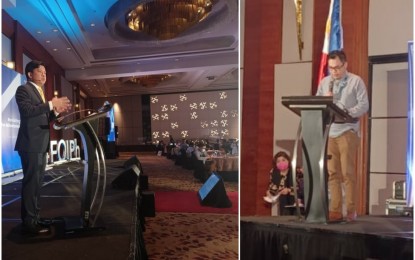
2021 FOI SUMMIT. A team from the Presidential Communications Operations Office (PCOO) visits Cebu City for the 2021 Freedom of Information (FOI) Summit on Tuesday (Nov. 23, 2021). PCOO Undersecretary Ramon Cualoping III (right) urged the people to use the FOI in making choices in the 2022 elections, while PCOO Undersecretary and FOI program director Kristian Ablan said they are hoping that more lawmakers would support the passing of its legislative version. (PNA photos by John Rey Saavedra)
CEBU CITY – The Freedom of Information (FOI) can be a good tool to learn more about the candidates and help voters make wiser choices in the May 9, 2022 elections, a ranking official of the Presidential Communications Operations Office (PCOO) said on Tuesday.
In his message during the 2021 FOI Summit in Cebu, PCOO Undersecretary Ramon Cualoping III said access to available information about the current administration can help citizens in deciding who they would vote for in the elections.
“Now more than ever, we need real transparency that shall help us make sound decisions in choosing the next leader of our nation – one that will continue the many great changes we have started in the country. So do your research and vote wisely in 2022,” he said.
Cualoping, the director general of the Philippine Information Agency (PIA), said they have been sharing information about the Duterte legacy, and enumerating the projects and programs hatched and implemented during the current administration that aim to provide a comfortable life to all Filipinos.
The agency, he said, has been actively conducting an information drive on the drug campaign of President Rodrigo Duterte, the Build, Build, Build, Build program as road to economic recovery, the resolve to end local communist armed conflict, the Universal Health Care Act and the 150 Malasakit Centers established nationwide.
“But this Freedom of Information is the cornerstone and is probably one of the greatest Duterte legacies. This is a program that the Filipino people should take advantage of because this is where people have the chance to make the government accountable,” Cualoping said.
The FOI gives an assurance that every Filipino wants to be partner for change towards good governance, he added.
Ces Rondario, founder of Vote Pilipinas, said through FOI, the group was able to launch a massive registration campaign, enabling the Commission on Elections (Comelec) to generate at least 7 million new registered voters.
The campaign that uses the online platform has reached at least 63 million people.
Rondario, during the panel session, said the FOI has empowered the Filipinos by giving them access to government information.
Legislative version
PCOO Undersecretary and FOI program director Kristian Ablan, in his report during the summit at the Radisson Blu Hotel here, said they are hoping that more lawmakers in the current Congress would support the passing of a legislative version of the FOI.
“Today, the FOI Bill is still pending in Congress… We remain hopeful that this piece of important legislation becomes a law before the end of the 18th Congress,” he said.
Ablan said a team from the PCOO participated in four technical working group (TWG) meetings this year to fine-tune the administration bill filed by Quezon City Representative Alfred Vargas.
The PCOO is pushing for the submission of a committee report this month and make it ready for the second reading before the Congress adjourns for its Christmas break.
Ablan recalled that the first FOI bill was filed by the late former Senator Raul Roco way back in 1987 when he was still representing Camarines Sur in Congress.
A group of lawmakers led by Representative Erin Tañada also filed an FOI bill which was approved by the TWG during the 14th Congress but it failed to become a law because the Lower House lacked quorum during the last day of session.
More FOI ordinances
Ablan also reported that in spite of the efforts of the PCOO’s FOI Project Management Office (FOI-PMO) in linking with various national government agencies, local government units, and other public entities in promoting transparency, only a few LGUs passed their own FOI ordinances.
In the four provinces of Central Visayas, the FOI-PMO recorded only two LGUs – the municipality of Consolacion in Cebu and the provincial government of Bohol – that have passed an FOI ordinance.
Nationwide, a total of 59 LGUs have adopted their own local FOI measures.
"We have also pushed for the institutionalization of FOI through its localization… And so, by hook or by crook, as we were determined to encourage (LGUs) to adopt and implement their localized versions of the FOI program,” Ablan said.
Five-year milestone
Since President Duterte signed Executive Order No. 2 shortly after assuming office in 2016, the PCOO has made significant progress in creating ripples and waves of positive and transformative change in improving the FOI landscape through the development of policies, monitoring compliance, forming partnerships, and conducting capacity-building activities, all of which uphold and strengthen the people's constitutionally mandated right to information, Ablan said.
He reported that a total of 53,309 standard requests and 76,635 electronic FOI requests were made, with 545 national and local government agencies and offices continuing to respond and facilitate request access to information.
The country now has a total of 4,322 designated FOI officers spread throughout the bureaucracy.
“Which is why we have implemented the ‘no wrong door policy’, which aims to reduce the number of FOI denials by allowing FOI officers to refer mistakenly lodged FOI requests to the proper agencies,” Ablan said.
The FOI-PMO, he said, has launched this year the electronic records management policy, for which they partnered with the National Archives of the Philippines in outlining proper management, storage, usage, and archiving of electronic records to keep with the current thrust of digitalizing records through available technology. (PNA)
